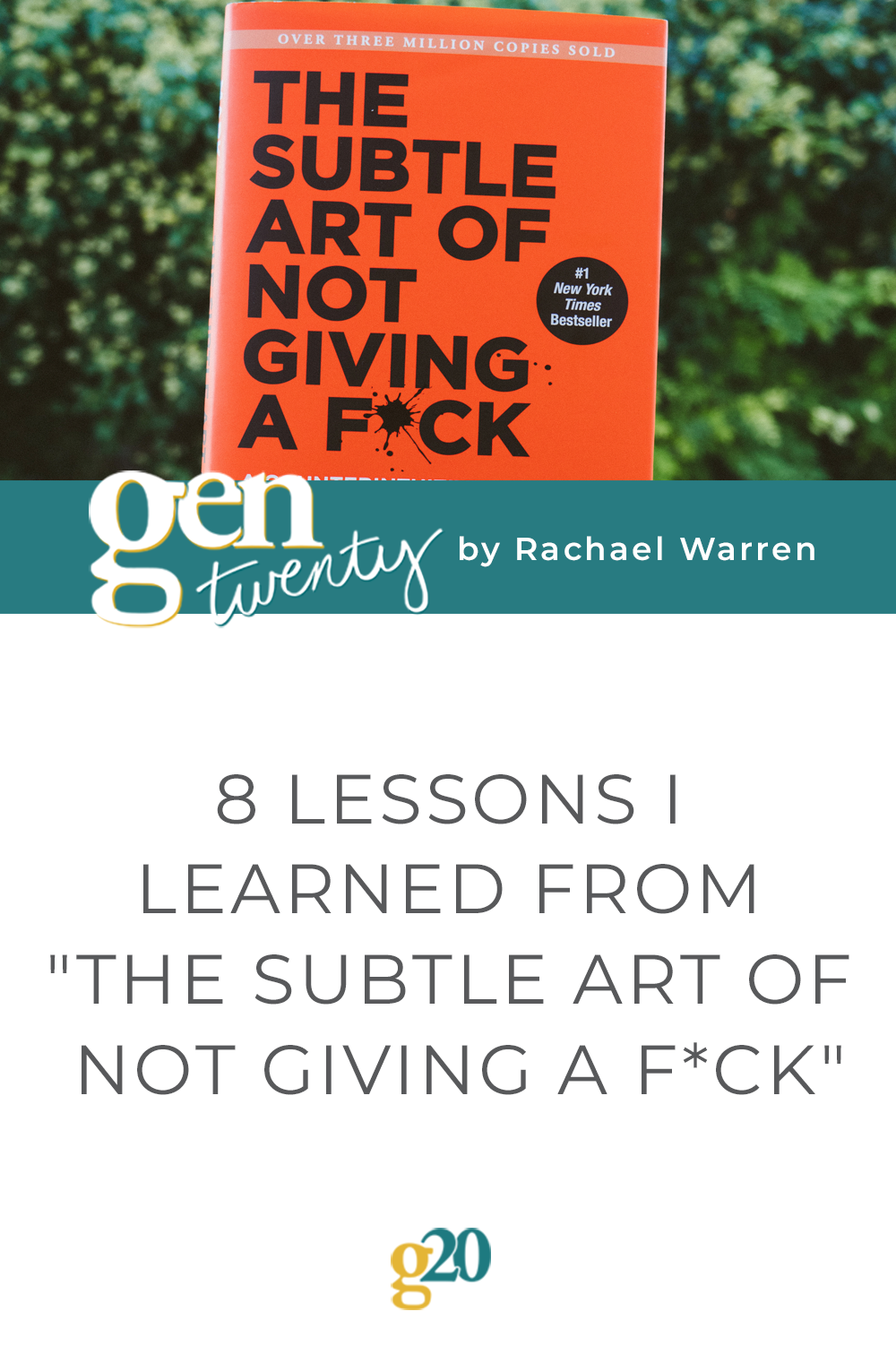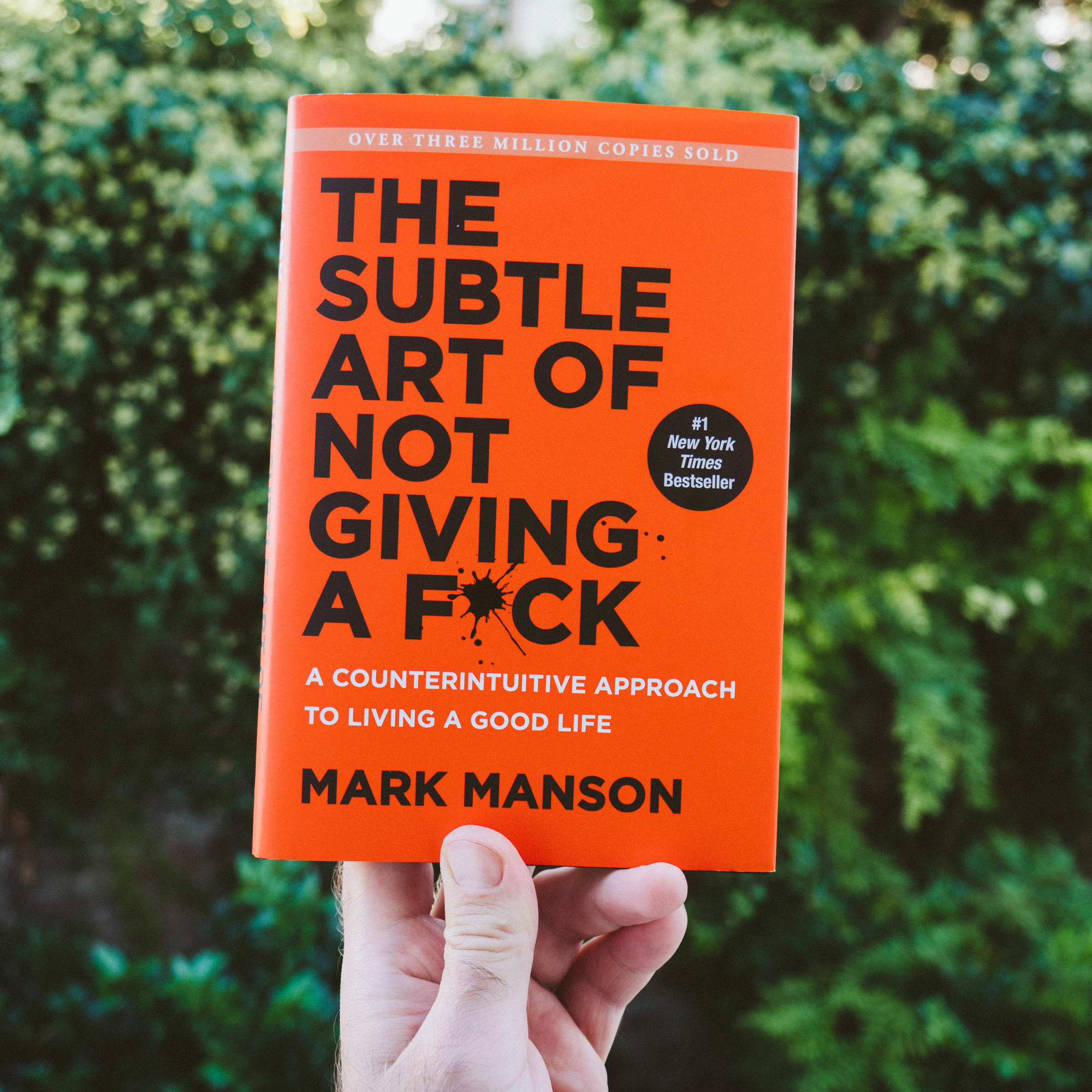The Subtle Art of Not Giving a F*ck is described as a self-help book for people who hate self-help books. Technically, it’s advertised as a generation-defining guide to life. However, I’d argue that learning the practical life lessons Manson lays out while navigating your twenties is probably convenient timing.
Manson’s life lessons are incredibly applicable right away, and having his guidance in mind while the majority of your decision-making years are still ahead of you gives you time to consider his suggestions carefully to ensure you’re living life as happily and freely as possible.
8 Lessons I Learned From The Subtle Art of Not Giving a F*ck
Who is Mark Manson? Why read The Subtle Art of Not Giving a F*ck?
If you haven’t already heard of #1 New York Times bestselling author Mark Manson, then here’s your short and sweet introduction: Manson writes science-based life advice that is both cheeky and blunt. He’s a blogger, an author, an active Instagrammer of pragmatic life advice, and the writer of a weekly newsletter that offers life-changing advice. His international bestseller, The Subtle Art of Not Giving a F*ck, has sold more than six million copies globally since it was published in 2016.
Through a collection of research-based facts, crude jokes, and thought-provoking stories, Manson’s international bestseller guides readers to come to understand that caring about everything ultimately means you care about nothing, so instead you must reserve “giving a f*ck” for the things that actually matter in life. Essentially, readers learn to improve themselves by learning to accept that unhappiness is sometimes inevitable and is at times necessary to work through life’s various challenges.
Manson’s Life-Changing Life Lessons
Overall, I really enjoyed The Subtle Art of Not Giving a F*ck. I found Manson’s writing to be witty, clever, crude, and harsh all at the same time. He isn’t one to sugarcoat the truth – and honestly, it’s refreshing. Manson isn’t afraid to shoot straight and his directness cuts through the fluff found in all too many self-help books out there. I can confidently say that the lessons I learned in The Subtle Art of Not Giving a F*ck are lessons I will refer back to time and time again.

Here are a few of Manson’s most notable lessons:
-
Happiness cannot be found somewhere. Instead, it’s a reward for good decision-making.
Happiness is not something that is magically bestowed upon you. You won’t find happiness waiting for you in a place, a job, an idea, or a book. Instead, happiness is a constant work-in-progress. True happiness is a positive emotion that you’re rewarded with after taking the proper action when faced with a problem.
-
Who you are is defined by what you’re willing to struggle for.
If you want the end reward, you have to be willing to struggle for it. You can’t want the result but not the process it takes to get to the end result. The most simple and basic component of life is that your struggles determine your successes.
-
Sometimes failure isn’t a failure and you’re looking at situations wrong.
It’s critical to set appropriate values for situations and measure them by appropriate metrics. What is objectively true about a situation you’re in is not as important as how you choose to measure the situation and value it. Problems may arise in certain situations, but you don’t have to view problems as failures. You get to control what your problems mean by how you think about them and the standard by which you choose to measure them.
-
Negative emotions are a necessary component of emotional health.
Things go wrong. People upset you. Accidents happen. Denying your negative emotions will only perpetuate problems, rather than solve them. Instead, you need to express your negative emotions in a healthy and appropriate way that aligns with your values. Problems add a sense of meaning to your life and if you deny them you rob yourself the chance to solve them and generate happiness.
-
Self-improvement is about choosing better things to give a f*ck about.
When you have poor values, you give f*cks about things that don’t matter and only make life worse. But, when you have better values, you divert your f*cks toward things that improve your state of well-being, generate happiness, increase pleasure, and lead to success. That is to say, when you give better f*cks, you get better problems and better problems lead to a better life. Choosing better things to give a f*ck about ultimately leads to self-growth and self-improvement.
-
You are individually responsible for everything that happens in your life, no matter the circumstances.
While you cannot always control what happens to you, you can always control how you interpret what happens to you and how you respond. Whether you like it or not, you are always taking an active role in what is happening to and within you, which means that you are consistently interpreting the meaning of every occurrence and moment. All that to say, you are always making choices about things to give a f*ck about, whether you realize it or not.
-
Accepting responsibility for your problems is the first step to solving them.
The more often you choose to accept responsibility in your life, the more power you will exercise over your life. Responsibility results from choices you’re currently making in the present. Taking responsibility for your problems is where real learning and life improvement comes in.
-
Life itself is a form of suffering.
Sometimes life sucks, and that’s actually okay. Suffering is biologically useful, as it’s nature’s preferred agent for inspiring change. A certain degree of dissatisfaction keeps you fighting, striving, building, and conquering. Pain, in all of its forms, is your body’s most effective means of spurring action. As much as you might hate pain, it serves a purpose – it’s useful. Pain and suffering teach you to pay attention when you’re being careless, show you what’s good for you versus what’s bad for you, and help you understand your limitations. Pain is an indication of something being out of equilibrium so you can recalibrate.

Craving More Life Lessons from Manson?
The Subtle Art of Not Giving a F*ck is chock-full of practical life lessons like these. As aforementioned, Manson’s writing can be crude, blunt, and borderline painful to read at times. He’s just that honest and that direct. His style and attitude may not be a good fit for every reader. However, if you can handle the cold, hard truth and you’re ready to unpack why you care too much about everything and too little about the things that actually matter, then I encourage you to pick a copy of The Subtle Art of Not Giving a F*ck up and get reading.
In 204 pages or less, you’ll learn what to give a f*ck about and what to stop giving f*cks about in order to live a happier life. It’s really that simple!
Have you already read The Subtle Art of Not Giving a F*ck? Share your thoughts in the comments!
